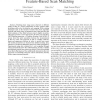Free Online Productivity Tools
i2Speak
i2Symbol
i2OCR
iTex2Img
iWeb2Print
iWeb2Shot
i2Type
iPdf2Split
iPdf2Merge
i2Bopomofo
i2Arabic
i2Style
i2Image
i2PDF
iLatex2Rtf
Sci2ools
141
click to vote
RSS
2007
2007
CRF-Matching: Conditional Random Fields for Feature-Based Scan Matching
— Matching laser range scans observed at different points in time is a crucial component of many robotics tasks, including mobile robot localization and mapping. While existing techniques such as the Iterative Closest Point (ICP) algorithm perform well under many circumstances, they often fail when the initial estimate of the offset between scans is highly uncertain. This paper presents a novel approach to 2D laser scan matching. CRF-Matching generates a Condition Random Field (CRF) to reason about the joint association between the measurements of the two scans. The approach is able to consider arbitrary shape and appearance features in order to match laser scans. The model parameters are learned from labeled training data. Inference is performed efficiently using loopy belief propagation. Experiments using data collected by a car navigating through urban environments show that CRF-Matching is able to reliably and efficiently match laser scans even when no a priori knowledge about ...
Laser Range Scans | Laser Scans | Robotics | RSS 2007 | Scans |
| Added | 30 Oct 2010 |
| Updated | 30 Oct 2010 |
| Type | Conference |
| Year | 2007 |
| Where | RSS |
| Authors | Fabio T. Ramos, Dieter Fox, Hugh F. Durrant-Whyte |
Comments (0)

